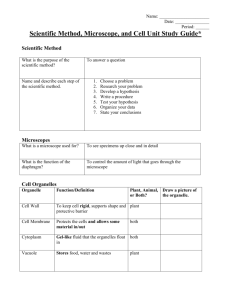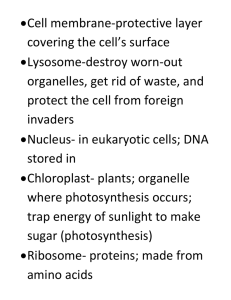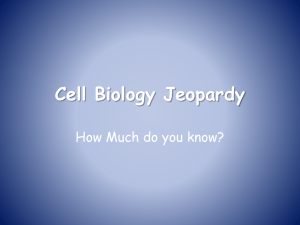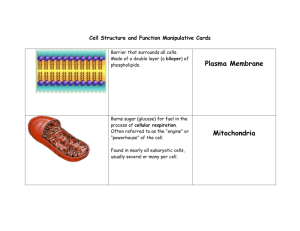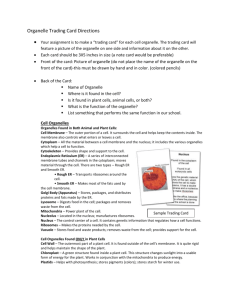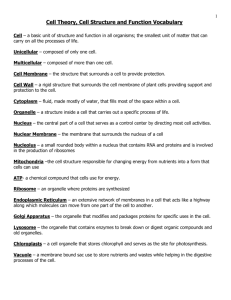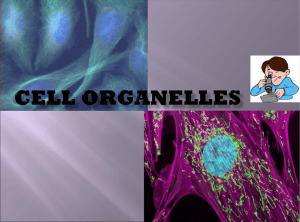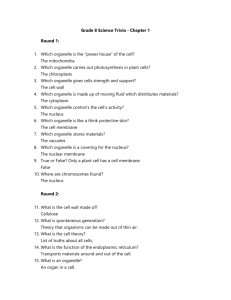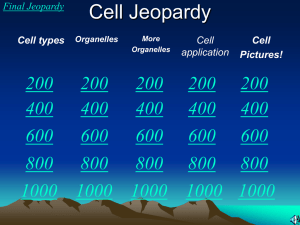Found in Plant Cells, Animal Cells or Both?
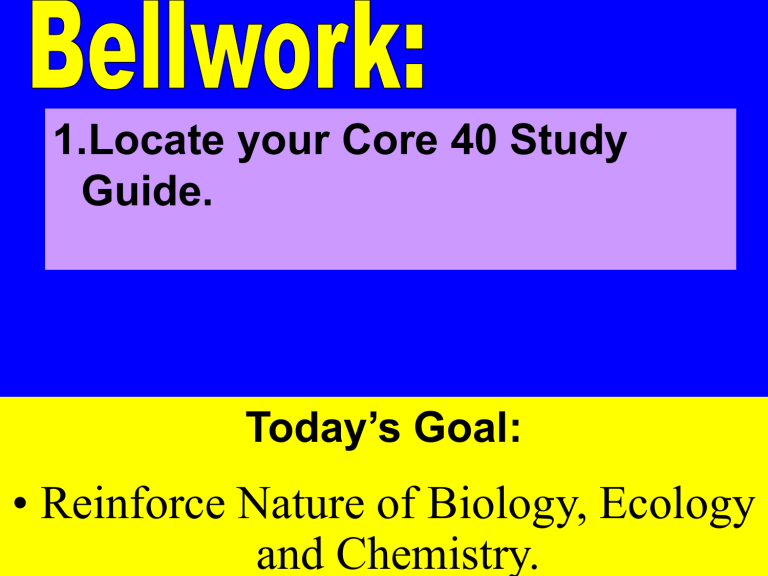
1.Locate your Core 40 Study
Guide.
Today’s Goal:
• Reinforce Nature of Biology, Ecology and Chemistry.
Core 40 Test
Practice
Second
Third
Inning 1 2 3 4 5 6 7 8 9 Total
Visitor
Home
Outs
Home
First
Batter Up!
Second
Third
Inning 1 2 3 4 5 6 7 8 9 Total
Visitor
Home
Outs
Home
First
Types of Cells
Organelles and Functions
Transportation
Energy
Photosynthesis
Respiration
Cell Division
Prokaryotic or Eukaryotic?
Prokaryotic or Eukaryotic?
Prokaryotic or Eukaryotic?
Plant Cell or Animal Cell?
Prokaryotic or Eukaryotic?
Plant Cell or Animal Cell?
Name the
Organelle?
Found in
Plant Cells,
Animal Cells or Both?
Found in
Plant Cells,
Animal Cells or Both?
Name the
Organelle?
Name the
Organelle?
Found in
Plant Cells,
Animal Cells or Both?
Found in
Plant Cells,
Animal Cells or Both?
Name the
Organelle?
Name the
Organelle?
Found in
Plant Cells,
Animal Cells or Both?
Name the
Organelle?
Outside the Cell
Found in Plant Cells,
Animal Cells or Both?
Inside the Cell
Name the
Organelle?
Inside the Cell
Enlarged
Found in Plant
Cells, Animal
Cells or Both?
Outside the Cell
Name the
Organelle?
Found in Plant Cells,
Animal Cells or Both?
Name the
Organelle?
Found in
Plant Cells,
Animal Cells or Both?
Name the
Organelle?
?
Found in Plant
Cells, Animal
Cells or Both?
What is it?
DNA
List the three parts of the Cell
Theory.
1. All living things are made of cells.
2. Cells are the basic units of life.
3. All cells come from pre-existing cells.
What are the two basic types of cells?
Prokaryotes and Eukaryotes
Which type of cell has a nucleus?
Present your answers!
Eukaryote
This is the simpler of the two types of cells.
Prokaryotes
This type of cell has membranebound organelles.
Eukaryotic
______________ is the thin, flexible barrier around all cells.
Plasma membrane (Cell membrane)
The plasma membrane is made up of two layers of
______________.
Phospholipids
What are the two parts of a phospholipid called?
Head and a tail
These molecules are located in the hydrophobic region of the membrane and strengthen the membrane.
Cholesterol
Scientists call the model they have developed to represent the structure of the plasma membrane the ______ ________ model.
Fluid Mosaic
What does it mean to be selectively permeable?
To choose what goes in and what doesn’t
T or F. All cells have cell membranes.
Present your answers!
True
T or F. All cells have DNA.
Present your answers!
True
T or F. All cells have cytoplasm.
Present your answers!
True
T or F. All cells have a nucleus.
Present your answers!
False
T or F. All cells have a cell wall.
False – animal cells do not.
What is the name of the membrane that surrounds the nucleus?
Nuclear envelope
What are the functions of the cytoskeleton?
For cell support and movement
The cytoskeleton is made up of what three components?
Present your answers!
Microtubules, microfilaments, and intermediate filaments
What do ribosomes do for the cell?
Present your answers!
Make proteins
Where can you find ribosomes in a cell?
Present your answers!
On rough ER, and in the cytoplasm (also in the nucleolus when they are being made
What are the two types of
Endoplasmic reticulum and what is the structural difference between the two types?
Present your answers!
Smooth and Rough – rough have ribosomes attached
What does the ER do for the cell?
Rough – modifies proteins
Smooth – makes lipids and breaks down drugs and alcohol
What does the Golgi apparatus do for the cell?
Processes and packages proteins for export
What is the function of a lysosome?
To digest or break down food, old organelles, or other waste
What type of molecules are inside lysosomes? (These molecules are what make the breaking down happen.)
Enzymes
What is the function of a central vacuole?
A place for plants to store water, minerals, and waste; strengthens the cell and helps support the entire plant
What do chloroplasts do for the cell?
Convert energy from sunlight to chemical or food energy; perform photosynthesis
Do animal cells have chloroplasts?
Present your answers!
No
What is the function of the mitochondria?
Present your answers!
To make energy (the power plant of the cell)
Animal, Plant, or Both:
Cell Membrane
Present your answers!
Both
Animal, Plant, or Both:
Endoplasmic Reticulum
Present your answers!
Both
Animal, Plant, or Both:
Mitochondria
Both
Animal, Plant, or Both:
Chloroplasts
Present your answers!
Plant
Animal, Plant, or Both:
Cell wall
Present your answers!
Plant
Animal, Plant, or Both:
Ribosomes
Present your answers!
Both
Animal, Plant, or Both:
Nucleus
Present your answers!
Both
Animal, Plant, or Both:
Golgi apparatus
Both
